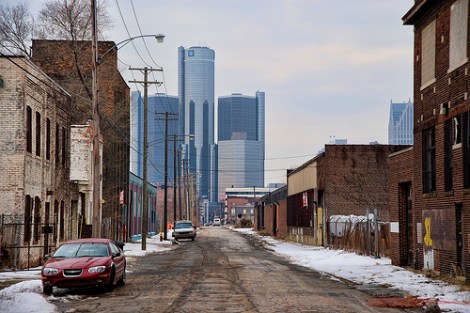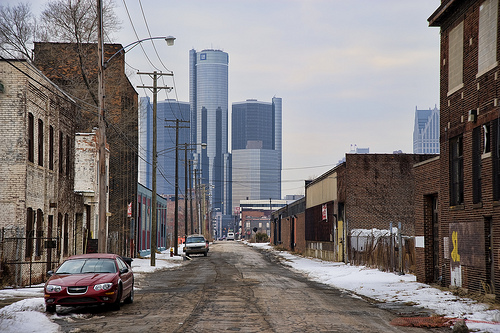From America’s capital of industry to its capital of decay, Detroit’s post-industrial run hit another pile of bricks today when Michigan Gov. Rick Snyder announced he’ll be naming an emergency manager to oversee the troubled city, putting the city government under state control. Snyder’s pick will have the power to sell city assets and cancel contracts to try to address Detroit’s more than $14 billion in long-term debt and avoid bankruptcy.

The move, which the City Council can appeal, punctuates decades of decline in the home town of General Motors Co. (GM) Snyder’s decision may inflame opponents, as the administration of a white Republican seizes control of a community that is predominantly Democratic and more than 80 percent black.
“It’s a sad day, a day I wish never happened, but it’s a day of promise,” said Snyder, who is in his first term. …
Opponents say state takeovers disenfranchise voters by stripping elected officials of their power over municipalities or school districts, and may protect bondholders at the expense of employees, services and taxpayers.
Just two weeks ago, Detroit’s Democratic mayor, Dave Bing, said in his State of the City address: “The picture is not all doom and gloom. Every day there is more hope and possibilities. Like many Detroiters, I, too, am a fighter. We can’t, and won’t, give up on our city.”
Today he struck an upbeat note in a statement responding to the governor’s announcement:
“If, in fact, the appointment of an emergency financial manager both stabilizes the city fiscally and supports our restructuring initiatives which improve the quality of life for our citizens, then I think there is a way for us to work together. We have always said that we need help from Lansing to implement our initiatives such as public safety, transportation, lighting and others.”
Detroit’s population has tanked in recent years. Just between 2009 and 2011, the city lost more than 200,000 people. Once a city of 1.8 million, it is now home to about 700,000. But those are 700,000 people who aren’t likely to agree with white Republican state politics, and Snyder hasn’t said yet who his emergency head will be, just that he has someone “in mind.”
The last two years have seen a number of municipal bankruptcies across the country, many of them cities that increased spending in fat years and fell on extra-hard times during the recession. Detroit would be the sixth Michigan city to fall under state control, which is in and of itself kind of amazing — and a little scary, if you’re in municipal politics: The emergency manager arrangement concentrates more power with one appointed person than any other last-ditch effort, including bankruptcy.
Several cities in Michigan, including Flint and Pontiac, have undergone multiple distinct periods of emergency management. Supporters of the policy say this recidivism demonstrates the ineptitude of city governments; opponents believe that short-sighted EM policies, with their focus on quickly eliminating debt, cripple city infrastructure and services in the long-term, leaving communities poorly prepared to recover.
Among the grassroots efforts to revitalize Detroit through this time of managed decline are movements to create more green space and urban farms. How might Snyder’s mystery manager feel about all those dirty hippies growing food in yards?
What happens next in Detroit will certainly have massive, and potentially disastrous, local results, but it could also have an impact for other struggling cities nationwide. As goes Detroit, so may go other troubled towns.



